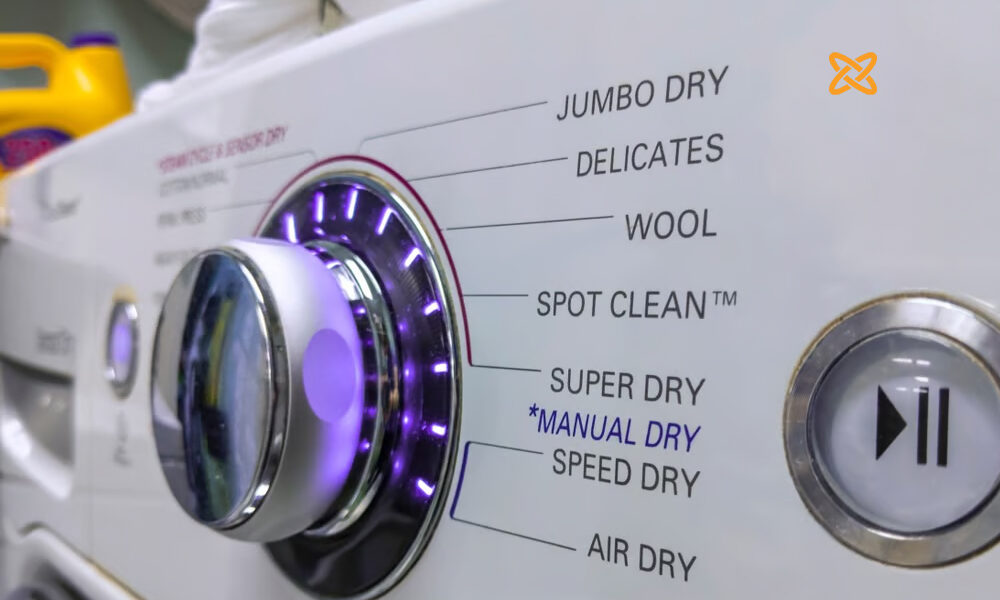Picturesque & Wintery UK Breaks to Take This Year
5th January 2023

Almost 440kg of carbon dioxide emissions is produced annually from washing and drying an average 5kg every other day. From energy wastage to chemical pollutants, laundry has an understated effect that can take a massive toll on the environment.
However, knowing how you can make your laundry eco-friendlier could benefit the environment as well as your pocket. With energy bills set to hit up to £2,500 annually, there is no better time to start reducing your energy and water waste.
Here, we will run through how you can promote environmentally friendly practices in the workplace.
Washing your laundry at 40 degrees Celsius is the most common temperature in the UK. However, this is not necessary. 30 degrees is considered the most cost-effective, as well as efficient, temperature to wash your clothes. Some clothing can even be washed at temperatures as low as 20 degrees.
Which? found that reducing your laundry temperature to 30 or 20 degrees can save you up to 38% and 62% of energy respectively – benefiting both the environment and your energy bills. By reading the manufacturing label to know which temperature is best for your clothing, you can effectively complete your laundry while reducing your impact on the environment.
The amount of time you let your washing machine run can impact your energy and water usage. While the average wash lasts 50 minutes to an hour, you can reduce this time to as little as 15 minutes, depending on your needs. A few uniform items, for example, would not need the same hour-long cycle as a full load including your bedsheets. Adjusting your wash-cycle temperature, speed, and duration can be the best way of doing your laundry cost-effectively.
Reducing the frequency of your washes can also help. On average, an individual will do one to three washes a week, with some people loading up their washing machines more frequently. Aiming to do larger washes less frequently will save you energy and water waste.
The detergent you choose can have vastly different effects on the eco-friendliness of your laundry. Your weekly laundry could be pushing out chemical pollutants regularly. Harsh detergents and bleach can cause both damage to the environment as well as potential skin irritation. Choosing gentle detergents can be just as effective for cleaning your clothes without the negative impact. You can even choose products such as a laundry egg, which can wash clothes for up to three years without the need for any detergent.
Understanding your machine’s capabilities can help improve the efficiency of your washes. The most common washing machine drum size is between 7–8 kg. Overfilling your machine might jeopardise its functioning – meaning your clothes will be dirtier and damper than you expect. As a result, further washes and spin cycles will be less efficient, which will drive up your energy costs and produce further carbon dioxide emissions.
Equally, outdated machines might be less efficient in saving you energy and water. As such, upgrading or purchasing a new model could be beneficial as modern machines incorporate more energy-efficient features. Understanding the maintenance of your machine can also make your washes eco-friendlier, – routine cleaning and proper water reserve maintenance will help your machine stay as efficient as possible. This will mean your clothes will be cleaner quicker, rather than potentially needing multiple washes to remove one stain.
Promoting environmentally friendly practices within the workplace is important to education and facilitating healthier lifestyle measures. By encouraging your employees to consider their impact on the environment, you can have an impact in the fight against climate change.
Educating your employees on the rising concerns of climate change and the small lifestyle changes they can make to affect climate change. While there is no guarantee that employees will change their laundry techniques, delivering classes or lunchtime learning sessions opens the discussion for more sustainable practices among your people.
An incentive can be to offer company-provided samples of environmentally friendly laundry products, as well as explain the monetary benefits of going eco-friendly.
Choosing manufacturers who are dedicated to sustainability can help reduce your company’s carbon footprint. Choosing work uniform suppliers who manufacture sustainable clothing and use environmentally friendly methods of production and transportation can offset the negative environmental impact of laundry.
Lisa Cunningham-Sherret, Design Sustainability Officer at Jermyn Street Design states: “Finding sustainable ways to provide uniform can make a bigger difference than you think. For workers, uniforms make up a substantial portion of our week, So they need to be comfortable. For businesses, uniforms should represent our values and personality. Choosing sustainable uniforms and processes can establish you as an environmentally conscious business.”
However, there are steps you can take to improve the eco-friendliness of your employee’s laundry. Uniform design, fabric, and even colour could change the impact each wash has on the environment. Depending on your industry, you may be able to swap synthetic materials for natural fibres, which are kinder to the environment from their creation as synthetic materials are a by-product of petroleum. Synthetic fibres also release microplastics into the air when being laundered, increasing the risk of respiratory harm to your employees. Equally, choosing uniform manufacturers who use natural dyes over chemicals can mean that employee washes are producing less polluted water as a product of their weekly laundry cycle.
Six per cent of all UK carbon dioxide emissions are due to laundry. The energy needed to power large domestic items, such as washing machines, has a substantial impact on both the environment and your electricity bill. However, minor changes to the way you do your laundry, as well as to the uniform you choose for your employees, can help reduce both personal and corporate carbon footprints.
Sources:
Energy bills to be capped at £2,500 for typical household – BBC News
https://cleanhomeguide.co.uk/environmental-impact-of-laundry/